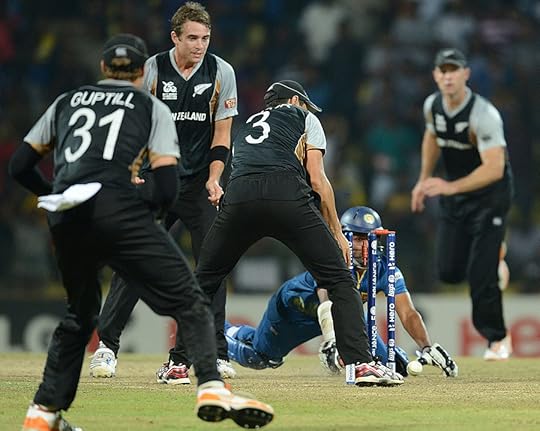Why the Super Over is the future of cricket

Endearing slapstick? We’ve got that too
© AFP
The World Twenty20 belatedly blasted into life yesterday, as the Super Eights power-launched what has become a ten-day bunfight. For the third global tournament in succession, the last eight could have been predicted at least 20 years ago, as the first eight Test nations eased their way through a group stage that will live as long in the memory as a goldfish’s tax return. Whilst this may raise concerns about the prospects of cricket ever truly extending beyond its historic boundaries as a global sport, even via the pimped-up high-speed vehicle of T20, what it has left us with is a week and a half of unpredictable high-stakes showdowns between old rivals, a rare commodity in any sport.
What do we know about the teams after the first week? Little more than we knew before the first week – in this format, on their day, or off their day, any of them could beat, or be beaten, by any of the others. South Africa, in essence, have not played yet – a facile ten-wicket defrocking of Zimbabwe and a seven-over microtonk against Sri Lanka offer scant evidence. All the other teams left in the tournament have both scored and conceded totals of more than 160, apart from Australia, who shipped 191 against West Indies but were well on the way to rocketing past it with ease when the rain intervened.
England look more likely to be bouncing up and down on the Being Beaten end of the see-saw, busily trying to work out which way up to read their How to Play Spin manual, but even they cannot yet be entirely discounted. An incapacitating dose of food poisoning affecting only mystery tweakers could easily strike at any moment. Or they could adopt the revolutionary tactic of giving more, rather than less, time at the crease to their best T20 batsman (or at least their best T20 batsman who is not cooling off on the selectorial naughty step [oddly located in a commentary box]).
The major talking point of the tournament has been the runaway success of yesterday’s Super Over, or One1, showdown between the hosts and the Kiwis, a glimpse into cricket’s rapid-fire future when the tedious longeurs of the T20 game are considered too much for the action-hungry TV consumer. On one level – with no boundaries and just two wickets in the entire match ‒ the Super Over match was eerily reminiscent of an entire day’s play in a 1950s Test. On another, it was a joyous celebration of how intense pressure can leave the minds of hardened sporting veterans as scrambled as an egg in a bobsled careering down an erupting volcano.
Kumar Sangakkara, one of the greatest and most influential players in recent cricketing history, an ice-cool man of competitive steel in his 482nd international match (or 482nd-and-a-bitth match), gave a two-ball exhibition of wicketkeeping ineptitude that even Kamran Akmal at his most creative would have struggled to surpass.
First, he fumbled a straightforward take to allow New Zealand two byes – 14% of their required runs in one clumsy-handed bloop. Next ball, he shelled an edge from McCullum, dropping New Zealand’s most likely six-tonker and allowing another unearned run, in one of the most clueless sequences of his stellar and largely clued-up career.
The McCullum drop completed one of the most error-strewn single deliveries that cricket has ever seen. Lasith Malinga, one of the universe’s leading T20 bowlers, needing to concede fewer than nine in three balls, flang down a half-volley far enough outside off stump that it would have been called wide had not McCullum, one of the solar system’s top T20 batsmen, slashed wildly at it, and connected with it enough only to (a) prevent it being called wide, and (b) snick a simple chance to Sangakkara, an undisputable cricketing legend with more than 500 wicketkeeping dismissals under his international belt, who, with hands as soft as a saucepan, clanged it. Amidst this mayhem of mistakes, it is a wonder that Umpire Taufel did not raise the finger and give non-striker Guptill out lbw due to sheer confusion, before awarding a free kick and telling the Sri Lankan fielders to stand ten yards away, giving Malinga 9.3 for artistic impression, and breaking down in tears.
Published on September 27, 2012 21:15
No comments have been added yet.
Andy Zaltzman's Blog
- Andy Zaltzman's profile
- 12 followers
Andy Zaltzman isn't a Goodreads Author
(yet),
but they
do have a blog,
so here are some recent posts imported from
their feed.



